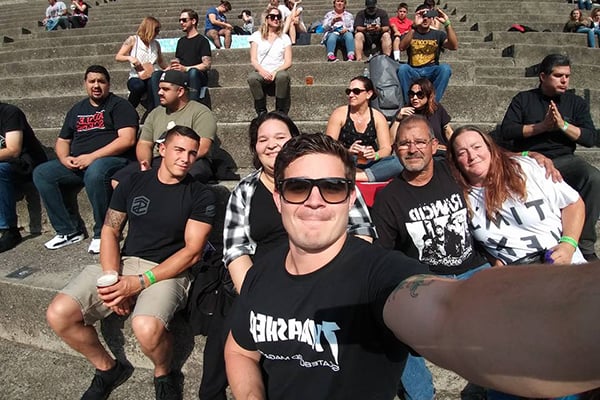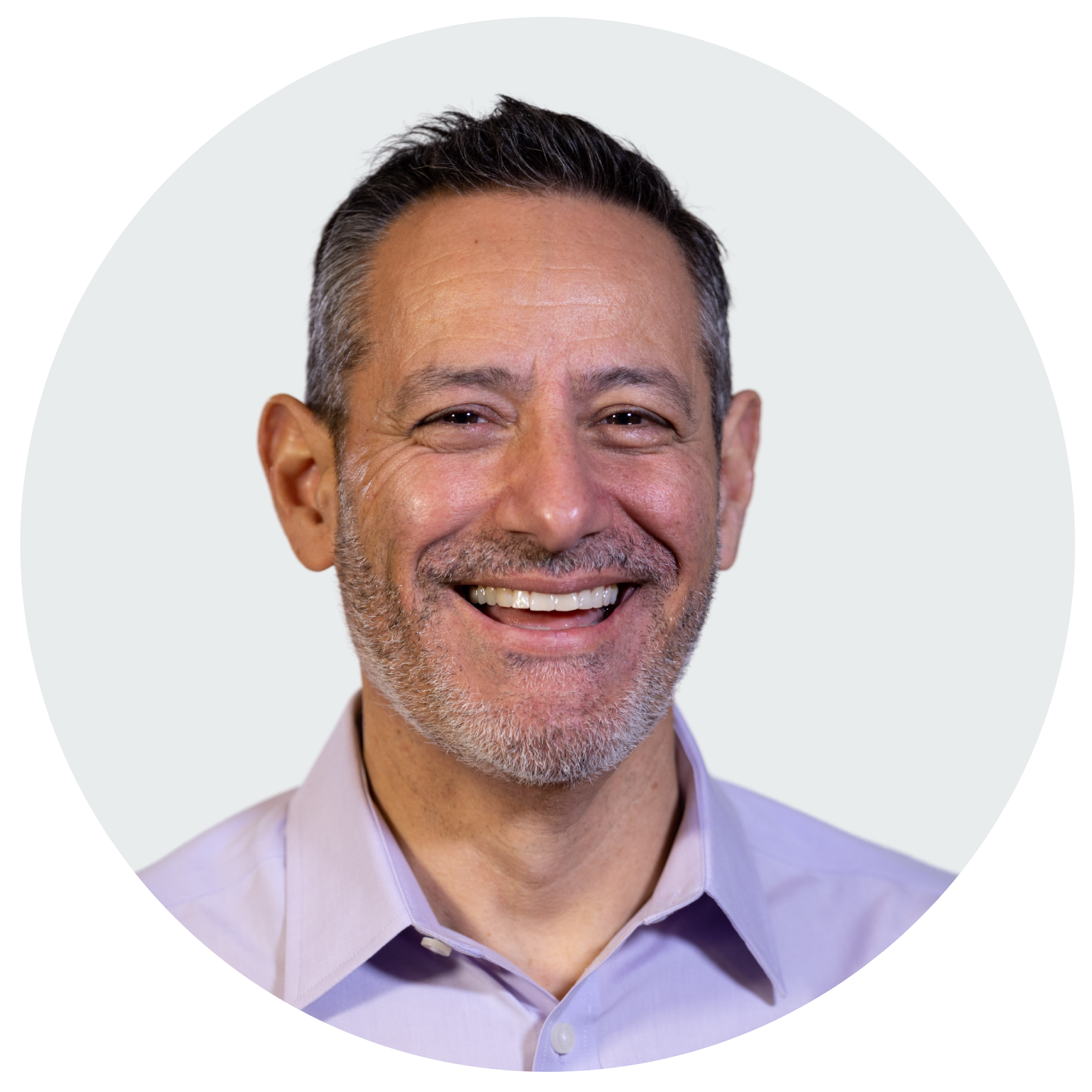Mental health awareness has touched so many aspects of my life, whether through career experiences, education, or my own personal life. I've had my own struggles and triumphs in all three areas, and I'd like to share the lessons I've learned through these experiences.
 Max (front and center) with his family at a punk concert at the Greek Theater in Berkeley, California.
Max (front and center) with his family at a punk concert at the Greek Theater in Berkeley, California.
Thankfully in the last few years, people have taken a closer look at and a more compassionate approach to mental health, normalizing discussions surrounding mental health support. In fact, studies have found that in the U.S., public opinion has improved favorably in regards to mental health treatment and its perceived effectiveness over time, continuing an upward trend. These same studies, however, show there's still is stigma around talking about and treating mental health due to socioeconomic, regional, and cultural considerations. The first step I can personally take to help make this easier for people to talk about is to be vulnerable myself. My intent with this blog is to be open about some of my experiences with some of the most severe mental health issues I've seen, my own experience with depression, anxiety and going to therapy, and the lessons I've learned from them.
Trauma Stewardship
The first lesson I learned is an idea best described with a phrase coined by Laura van Dernoot Lipsky called 'trauma stewardship.' The idea behind this phrase, also known as vicarious trauma, is that individuals who have high levels of emotional intelligence and empathy, and are exposed to others' trauma, suffering, hardship, or loss, may experience heightened mental health issues as a result of taking on this trauma. I, like many people, have always tried to be there for others to listen, console, and offer help. In doing this I've sometimes found myself emotionally drained.
It’s okay to feel this way.
When I was in college, I worked at a level 14 group home (there are only 14 levels in CA) and I felt this in full effect. Daily, I responded to children who were trying to hurt themselves and others around them. All they'd known their entire lives was what it's like to be hurt and as a result, expressing themselves through violence felt familiar and natural--this was the only way they knew how to express emotion. As I began to understand the kids, help them process through their emotions and gain their trust, I became a sounding board for all of their experiences and trauma. Suddenly, the cuts and bruises I had from the job felt less significant as I tried to empathize with hearing about years of intense neglect and abuse. My bewilderment and empathy at what I saw and heard became internalized trauma. I found myself more tired, often taking my work home , and starting to react negatively to my every day--emotional exhaustion had been reached. What once began as feelings of intense empathy turned into a feeling of, well, no feelings. I was numb and found my self no longer fazed by hearing about trauma, or even by being attacked.
This was my first lesson: Know your limits.
After that realization, I knew it was time to leave that job because I wasn't doing any favors for the staff or children. They needed someone who could support them in a way I no longer could. And that was okay; it continues to be okay.
Emotional Redemption
You may find that like me, you feel exhausted by others' trauma. You might find yourself unable to be at your best because of it. But sometimes even if you're not at your best, people you care about may still need you, so getting better is the next step and it's the next lesson I learned: emotional redemption.
For some time after leaving the group home, I carried the weight of my experiences. Knowing what some of the children went through, seeing what they were currently going through, and coming to terms with the dangerous situations I was put in all weighed heavily on my psyche. I felt despair, like there was no way this world was going to be okay when all this trauma just keeps happening. Couple that with the anxiety of graduating college with a Psychology degree and experiencing a life-threatening injury that hospitalized me for a week, I wasn't in a good place. My feelings went neglected and ignored. Until I went to therapy.
Having been a student of psychology and in the field for a few years, I recognized that I was having anxiety attacks, obsessive thoughts that resulted in compulsive behaviors, and major depressive disorder. However I wasn’t doing anything about it. Part of me just wanted to ride it out and wait for the feelings to go away. I leaned on this idea of the hedonic treadmill, which essentially professes that no matter how happy or sad, you'll always return to some sort of baseline emotional state. However, there was something that I wasn’t taught with that theory in that, much like running on a treadmill, you have to put in work to keep it moving. More importantly, you have to keep pushing even though that run is going to get a lot tougher as you work through it, especially the first time. At some point in that run, you begin to relax your shoulders, find your pace, and suddenly it's not as hard anymore. As time goes on, if you keep at it, what used to be excruciating now feels manageable. Is it still difficult? Yes, but you 've now trained to make that run just a bit easier.
This is what I finally realized when faced with the reasons for my anxiety and the excuses I made to keep engaging with destructive coping mechanisms. It was difficult to feel like I wasn't strong enough to take on others’ trauma and be there for them because it felt like failure--failure to be the person I knew I could be. Getting away from that idea of failure was my emotional redemption. The strongest people in the world all need something to help them maintain their strength and it may take some time plus a lot of effort to find, but it's important to care for yourself so you can care for others. Thanks to what I learned from therapy, I can recognize when the emotional exhaustion begins to take over again and have the tools to bring myself back to a good place. Being in that good place and maintaining my mental health is what allows me to be there for others.
Continuing Self-Care
To whoever is reading this, I want you to take away a final lesson from my experiences: self-care and therapy didn’t end at me testing low enough for long enough on the PHQ-9 (standard for depression screening). The feelings of anxiety and emotional exhaustion came back from time to time (and quite a bit last year), but because I put myself out there and got help, I learned to recognize and cope with these waves. But as I tried to be there for others, I learned to first go back and get stronger myself. Without being strong for myself, becoming a trauma steward would be much more draining.
Life will continue to challenge you, so I encourage anyone facing those challenges to seek out ways to meet them with the strength you need. Let’s keep making mental health something we can all talk about and focus on the same way we emphasize our physical health.
More Resources
We encourage everyone to take care of their mental health. Below is a list of resources if you're struggling with your mental health or need a place to start:



 Populus Group
Populus Group Bobby Herrera
Bobby Herrera
Leave a comment